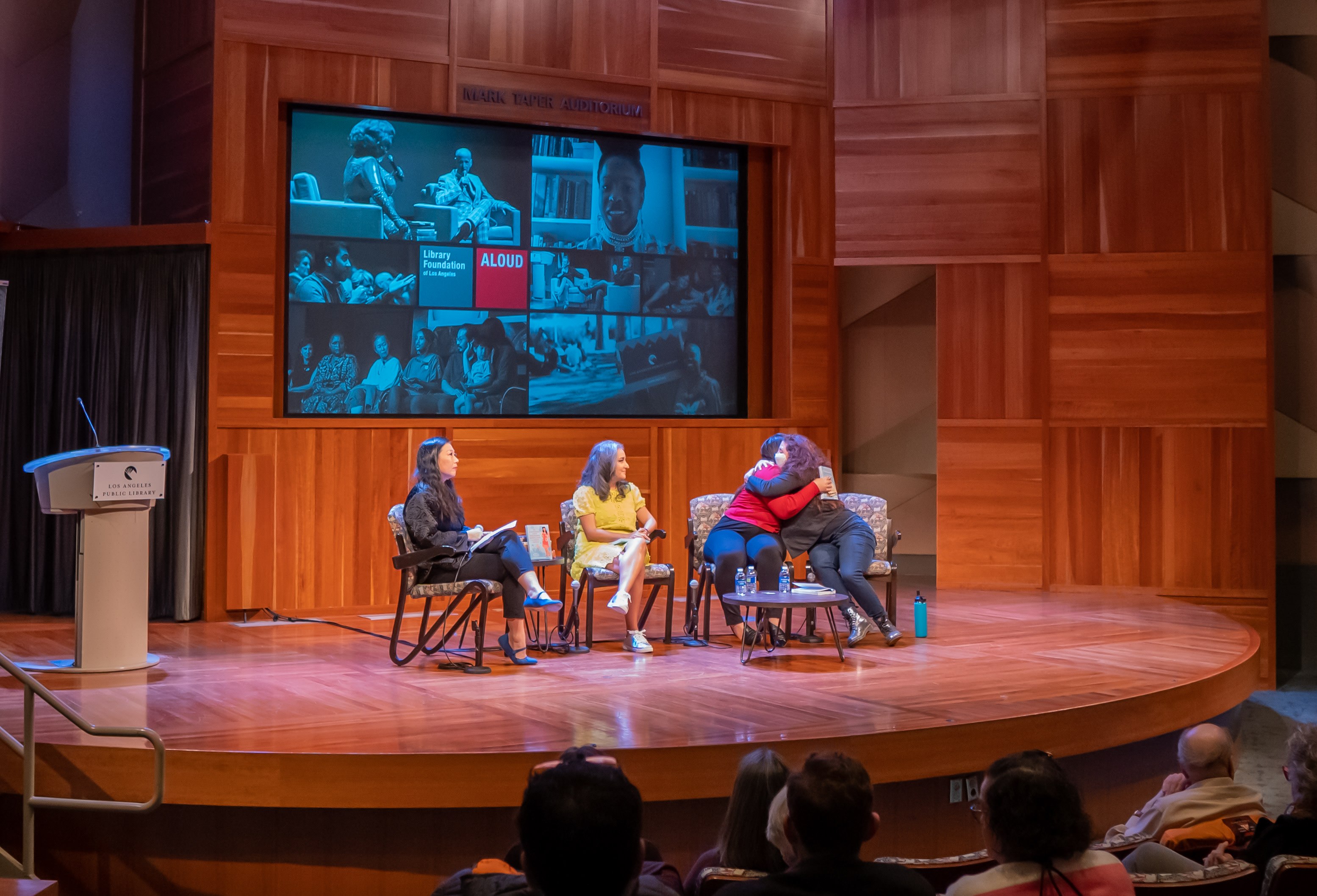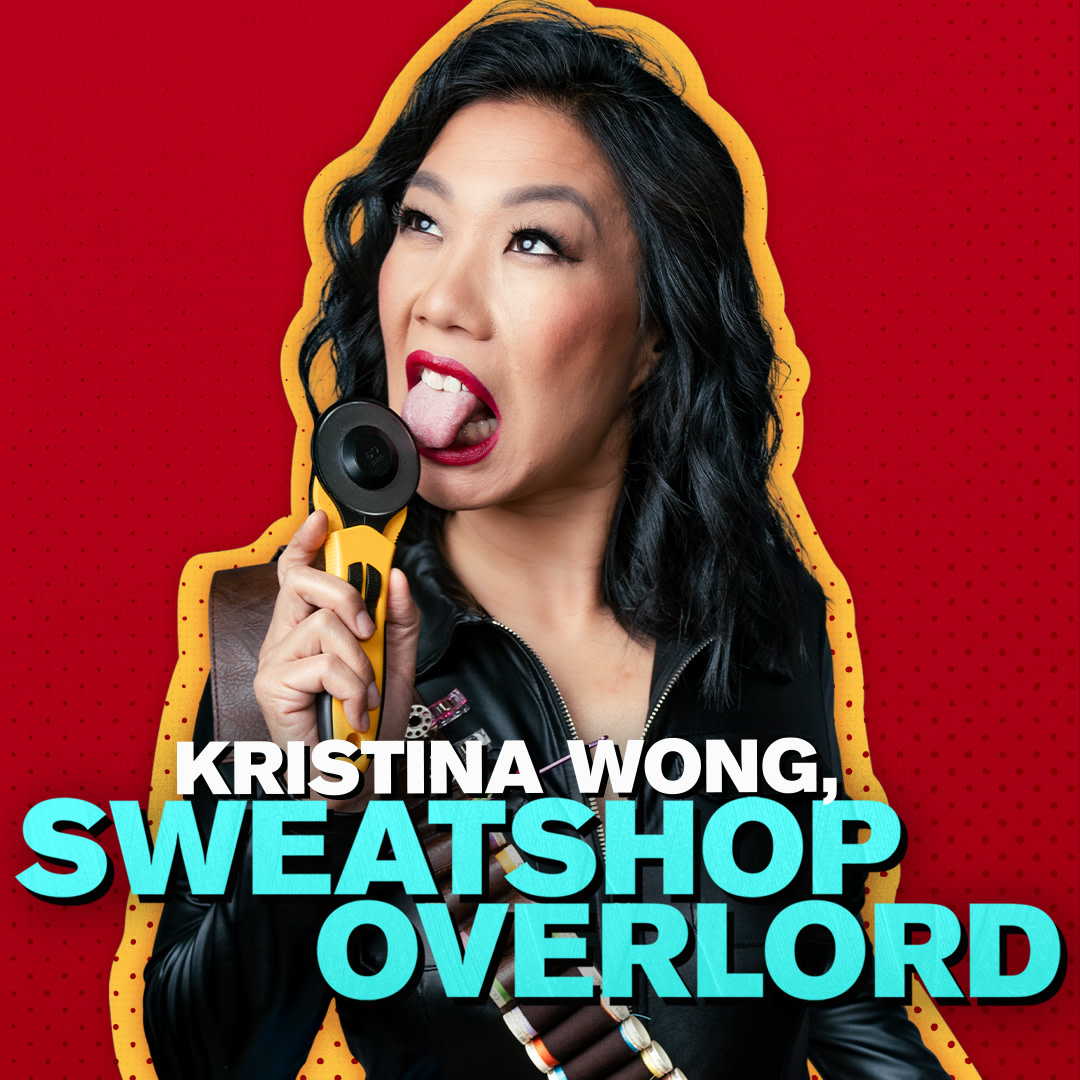Going down sewing with the Auntie Sewing Squad


“Building [the Auntie Sewing Squad]...has been a radical experiment in generosity, intersectional alliances, and a paradigm outside of capitalism…If this is the end, we go down sewing,” Kristina Wong wrote of her experience founding the Auntie Sewing Squad—a mutual aid group born from the pandemic and the subject of her latest play, Kristina Wong, Sweatshop Overlord. While she was the founder and “Overlord” of the organization, she did not make and ship hundreds of masks to people in need alone. Alongside her were around 800 “Sewing Aunties” across 33 states, and two “Super Aunties"—members of the Auntie Sewing Squad who helped with the group in an administrative or organizational way beyond sewing.
At the Los Angeles Central Library in Downtown L.A. in early February, Wong joined two of these Super Aunties and one Sewing Auntie to discuss their involvement in the mutual aid organization and contributions to their book, The Auntie Sewing Squad Guide to Mask Making, Radical Care, and Racial Justice. The event was a part of the ALOUD lecture series, sponsored by the Library Foundation of Los Angeles.
Jessica Arana first approached the Auntie Sewing Squad with a request—Her brother was an essential worker in 2020 who needed masks for himself and his coworkers. After witnessing how the group was able to mobilize, she joined the team at the suggestion of another member. She dedicated her weekends and evenings to the group, pitching and helping create a spreadsheet of requests along with her husband and connecting with farm workers, formerly incarcerated individuals, and asylum seekers at the U.S. and Mexico border alongside partner organizations.
“Together, the squad was disrupting systems that kept vulnerable people from getting the protection they needed,” she said. “My Auntie work was driven by the reality that working-class people and their communities are often ignored and denied humanity. The partner organizations taught me that their humanity must constantly be restated and reinforced.”
Arana wrote an essay on the connection between that sentiment and the “painful connection” to her grandmother’s labor as a maid for wealthy families in Mexico.
“I do dream of my Mexican grandparents and our Mesoamerican indigenous ancestors,” Arana read. “It happens while I’m awake and in my memory. I remember the brown, resilient, and resourceful working hands that held me with love.”
Super Auntie Māhealani Flournoy was also inspired by her family to join the Auntie Sewing Squad. Her mother “magically created” prom dresses, bridesmaid dresses, and ice-skating costumes. With a machine and “the University of YouTube,” Flournoy set out to help sew masks.
At the time of the stay-at-home order, her life as she knew it was upended. Her son was born with a rare genetic disorder, and his medication left him with an incredibly suppressed immune system. Flournoy is also a chef, who had just returned back to work before the stay-at-home orders halted indoor dining.
She turned to the Auntie Sewing Squad to find a sense of focus and purpose during a tumultuous time.
“The [Auntie Sewing] Squad has helped this Indigenous woman of color protect the loves of my brothers and sisters in Indigenous communities and other vulnerable people,” she said. “Though I came to the Squad seeking personal fulfillment, I am humbled to be a part of something much bigger and more impactful.”
Before finishing her segment, she paused to address the room to share of her son’s passing and how his life could hopefully help others born with the disorder he had. “The Squad saved me, so now I save others.”
Fellow Super Auntie Laura Karlin was a new mother around the start of the pandemic, just returning to work as the Artistic Director and Founder of Invertigo Dance Theatre as stay-at-home measures began. “My world was collapsing,” she reflected. So, she messaged Kristina, “I’m broke, sleep deprived, and I don’t sew, but I still want to help.” She started by sending moisturizing balms to the Aunties that did sew as a way to show appreciation for the work they were doing. Soon, she would work alongside Arana to connect with farm workers.
While the “Sewing Squad” has retired, she is one of the “Aunties Not Abandoning Labor” and has helped organize other mutual aid requests—like a winter coat drive for the Lakota communities and drives for heaters.
Her contribution to the book was an ode to the spreadsheet Arana's husband Nathan Stubley helped create and to her young daughter’s future.
She wrote:
“Dear spreadsheet of glory,
I have hovered over you as I do with my newborn baby.
I hope one day she knows
her Mama went down—well, not sewing, but, well,
recording the names of those who did, dammit, and
I hope one day she knows
her Mama won’t go down without a fight.”
Want to learn more about the story of the Auntie Sewing Squad? Kristina Wong, Sweatshop Overlord runs at the Kirk Douglas Theatre from February 12th through March 12th. Tickets are available here.
Kristina Wong, Sweatshop Overlord

